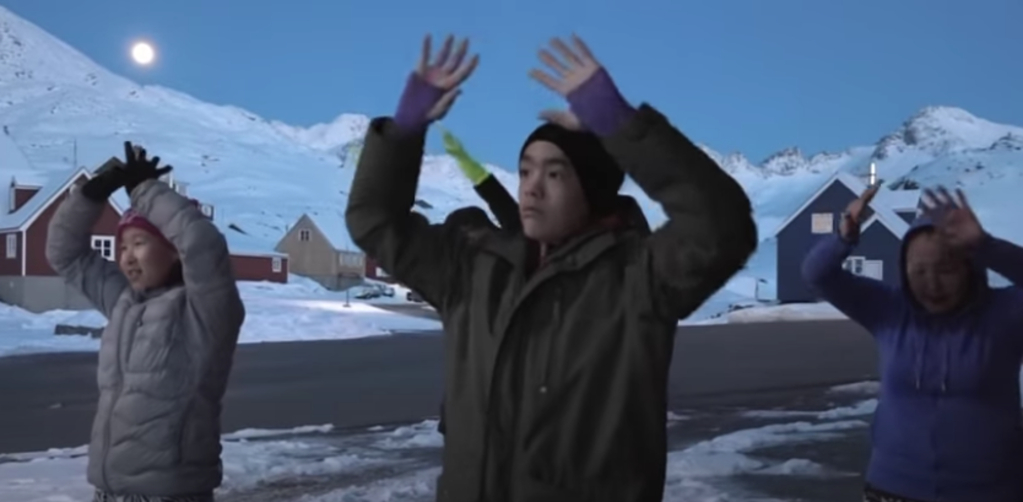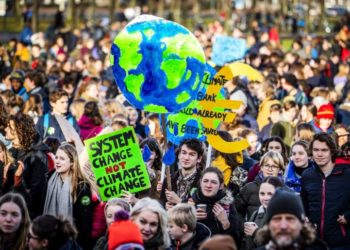Her traditional hand and face markings a sign of Inuit pride, Seqininnguaq Lynge Poulsen is part of a new generation in Greenland seeking a fresh cultural identity with an eye to independence one day.
In Greenland, a Danish autonomous territory in the Arctic holding legislative elections on Tuesday, almost 40 percent of the 56,000 inhabitants are under the age of 25.
Young people here have long struggled with high rates of sexual abuse, violence, suicide and alcohol addiction.
Inuits — who comprise 90 percent of Greenland’s population — have grappled with identity issues as the modern world has affected their traditional way of life during and after Denmark’s colonization, which ended in 1953.
Poulsen, 19, is an indigenous activist who has represented Greenland in various international forums, including UN summits on indigenous youth, and is part of what researchers have termed an Inuit “revival”.
The dotted lines sweeping across her cheeks and chin are tattoos which before colonization signified an Inuit’s coming of age. The lines and geometric symbols on her hands and forearms are also traditional Inuit markings.
She had hers done about a year ago to honor her culture and ancestors.
“I wanted to show the rest of the world how proud I am of being Inuit,” Poulsen, whose first name Seqininnguaq means ‘lovely sun’, tells AFP in Nuuk, Greenland’s capital of 18,000 people.
“I think we need more empowerment to get mentally ready for independence. The mindset needs to change,” says the teen, who has been open about her own struggles with substance abuse, suicide attempts and an abusive relationship.
“We really want to decolonize the system, to adapt it to our way of doing and thinking, especially with the school system.”
‘Not enough educated people’
Only one in two Greenlanders has a high school diploma.
In the election campaign, “the education system should be the number one topic. It’s not adapted to the Greenlandic youth,” echoes Morten Boller.
The 21-year-old from the western town of Kangerlussuaq recently graduated from high school and will soon begin training in Nuuk to work at an airport.
Like him, most youths who want to continue their studies have to leave their villages, often for Denmark.
“We don’t have enough educated people in Greenland and people come from Denmark for work. That’s why we have this victim-helper mentality,” laments Poulsen, who also wants to study abroad but plans to return to Greenland.
University of Greenland economist Birger Poppel says the school system ought to address the special needs of Greenland’s youths.
Among other things, it should “incorporate knowledge from research about learning disabilities among kids with traumas from neglect and abuse,” he says.
More than one in three people in Greenland are victims of sexual abuse, usually during childhood, according to a 2018 government report.
Reclaiming Inuit heritage
These crimes, often linked to alcohol and drug consumption, have started to decline thanks to a new campaign launched three years ago.
But they still occur far too frequently in the poorest homes, often in small remote communities, says Peter Berliner, a professor of social sciences at the University of Greenland.
“Inequalities in Greenland are getting bigger and bigger, and the gap between rich and poor is at the level of the United States, far from the level in other Nordic countries,” he says.
The island also has one of the world’s highest suicide rates — an average of one per 1,000 inhabitants — with youths most at risk, according to a report by the Nordic Welfare Center.
“With the modernization of Greenland, a lot of Greenlanders got lost. Smaller towns and settlements were closed… people were moved from their homes, placed in a new industry (such as fisheries), thus acting less and less like hunters or gatherers,” notes Greenlandic political scientist Nauja Bianco.
Climate change has now spurred the younger generation to look to their roots.
“We’re facing a cultural revival in the wake of the challenges of climate change… The philosophy, the life values of the indigenous culture have become very popular,” says Berliner.
The younger generation is also “more eager and open to discuss… the impact of Denmark’s colonization,” adds Bianco.
“There is an enormous potential for transformation on how you are seen and see yourself, and it’s important to show and reclaim our Inuit heritage,” she says.
Morten Boller is however sceptical.
“I’m tired of people crying about Danish oppression. I understand a bit but they don’t look at the benefits the Danes give us. The Danes, they pay for our corona vaccine and give it (to us) for free.”

















